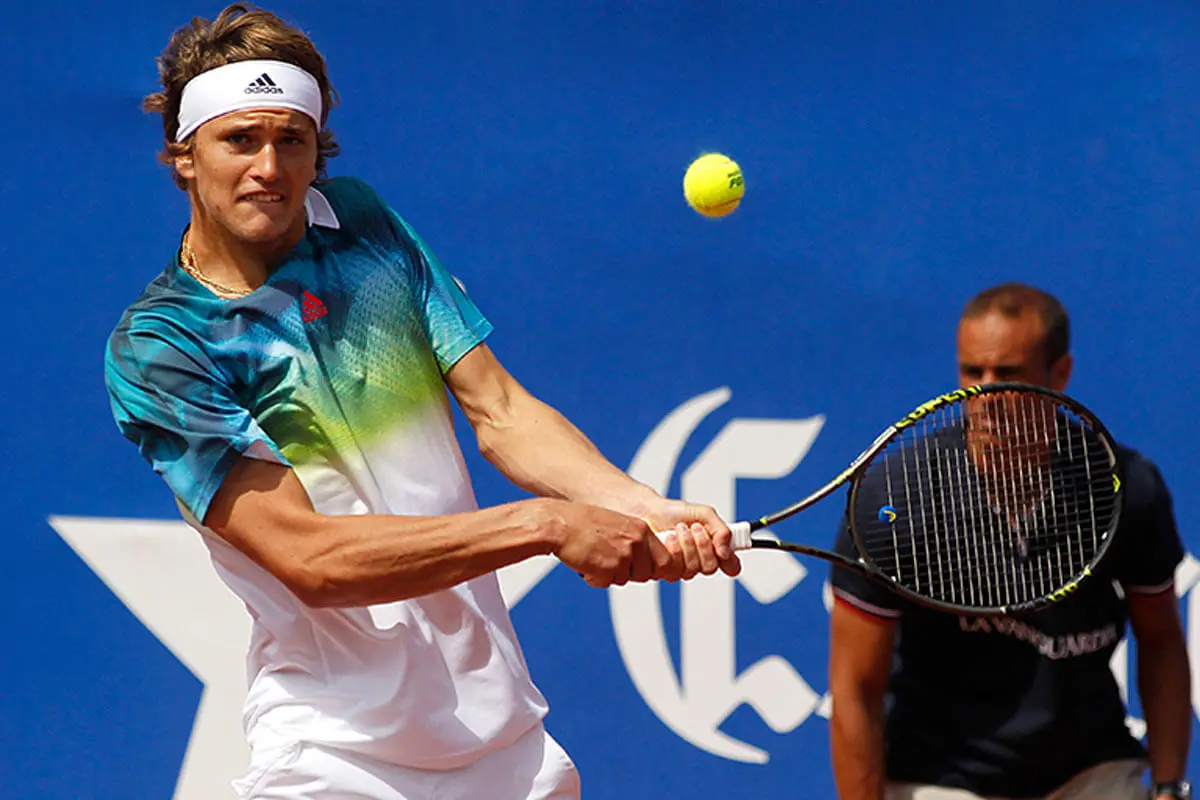Alexander Zverev: Diabetes Is No Obstacle to Being a World-Class Athlete


Reviewed and approved by the doctor Leonardo Biolatto
Alexander Zverev, the world-class tennis player, has shocked the world by revealing that he has been diagnosed with type 1 diabetes since the age of three. He’s always seen arriving at matches with a backpack. Because of this, it was rumored that he would use it during competitions to receive technical advice via cell phone. The truth is that he does it to monitor his blood glucose.
This confirmation from one of the best tennis players in the world is striking. It’s generally believed that the disease limits sports practice. But now we have compelling evidence to the contrary.
In this article, we’ll tell you how Zverev, at the age of 26, has managed to overcome his diagnosis and live with the disorder while being an elite athlete. Learn more.
What is type 1 diabetes?
Type 1 diabetes is a chronic disease. According to the Pan American Health Organization (PAHO), it’s an endocrine problem in which the pancreas stops producing insulin or does so in insufficient quantities. Therefore, patients must inject the hormone to make up for this deficiency.
According to the international organization, it’s the fourth leading cause of death in the Americas. If it isn’t properly controlled, it causes serious damage such as the following:
- Blindness
- Kidney failure
- Myocardial infarction
- Cerebrovascular accidents
- Delayed wound healing
- Tissue death in the extremities, especially in the lower limbs
This type of diabetes is also known as insulin-dependent, juvenile or childhood-onset diabetes. Symptoms become evident at an early age and form a classic triad of excessive urine excretion, excessive thirst, and constant hunger, as they tell us in the Lancet. At the same time, patients often have unexplained weight loss, visual problems and fatigue.
Treatment consists of daily insulin injections. Similarly, a strict diet limiting the intake of simple sugars must be followed and glucose levels must be monitored regularly.
Inadequate management of the disease can lead to life-threatening situations. A diabetic coma is a dangerous and fatal condition, for example.
Sport and diabetes, of course you can!
Alexander Zverev revealed that he had type 1 diabetes during an interview for Channel Nine in Australia. He told that media outlet that he never thought of his diagnosis as an obstacle to becoming the athlete he is today. However, the doctors weren’t at all optimistic about his goal.
I always told the doctors, “Yes, I want to play tennis”. That’s the only thing that really matters to me. Some of them said, “No, you have to stop, there’s no way you can be a professional athlete with this kind of disease. There’s no way you can play such a hard physical sport.”
Although it was annoying to receive these words, his desire to prove otherwise was greater. In addition to this clear example, there are experts who agree with the tennis player. Let’s see why!
According to scientific studies on the impact of diabetes in high-performance athletes, the main reason for abandoning athletic activity is related to the inability to regulate blood glucose levels. In other words, people living with diabetes can have spikes in blood sugar that produce very uncomfortable symptoms.
For this reason, athletes should be closely monitored, both at rest and during practices and competitions. The precise dose of insulin to be administered should be adjusted based on physical requirements. Likewise, the carbohydrates to be ingested must be accurately accounted for.
Zverev takes advantage of the gaps in the matches to assess his blood sugar levels. To do so, he uses his backpack. And it’s something that he can neither skip nor put off.
The correct diet
Nutrition is a pillar of every athlete, regardless of whether he or she lives with diabetes or not. However, when there is a specific diagnosis, as in the case of Alexander Zverev, there are requirements to consider.
Patients with diabetes require an interdisciplinary approach that includes the support of a nutritionist. This is confirmed by expert consensuses, such as the one published in Diabetes Care.
Research on the subject highlights the role of carbohydrates in this type of patient. However, experts don’t yet agree that a drastic reduction of carbohydrates is beneficial. In fact, some doctors promote regular consumption of these nutrients (45-65% of daily calories) with an adjustment of insulin doses to compensate.
When considering a low-carbohydrate diet for diabetes, a maximum of 30% of daily calories from these nutrients is set. Even so, each patient is different. Someone who is obese or overweight isn’t the same as an elite athlete, for example, who would require energy from glucose for his movements.
Beyond the discussions, there are studies that claim that the consumption of tropical fruits and fish help to maintain good metabolic control. This should be highlighted, as for a long time now fruits have been left out of the diet of people with diabetes.

Weight control
There’s scientific evidence that obesity is directly related to diabetes. To such an extent that there’s a new term in vogue: “diabesity”.
In type 2 diabetes, being overweight seems to be a risk factor for developing the condition later on. In contrast, in type 1 diabetes, weight gain may be a consequence of a poorly planned diet or inadequate use of injectable insulin.
Scientists from the Translational Research Institute for Metabolism and Diabetes warned that weight gain is often overlooked in the context of type 1 diabetes. According to their research, there’s a lack of precise guidelines for patients to prevent weight gain. And not only through diet, but also through physical exercise.
People with diabetes should include physical activity in their daily routine. Of course, not everyone will be like Alexander Zverev, at the top of the tennis world, but they can be athletes. The secret lies in proper care to reduce risks, and training under the supervision of professionals.
Overcoming a diagnosis to help others
Alexander Zverev has shown that this type of diagnosis shouldn’t limit dreams. Although he has lived with diabetes since he was three years old, he has become an example in sports.
As a type 1 diabetic myself, I want to encourage children with diabetes to never give up on their dreams, no matter what others may tell them.
In order to break down the stigmas about this disease and raise awareness about its relationship to good lifestyle habits, he created a foundation. The Alexander Zverev Foundation focuses on supporting children with type 1 diabetes and promoting care to prevent type 2 diabetes.
All cited sources were thoroughly reviewed by our team to ensure their quality, reliability, currency, and validity. The bibliography of this article was considered reliable and of academic or scientific accuracy.
- Corbin, K. D., Driscoll, K. A., Pratley, R. E., Smith, S. R., Maahs, D. M., Mayer-Davis, E. J., & Advancing Care for Type 1 Diabetes and Obesity Network (ACT1ON). (2018). Obesity in type 1 diabetes: pathophysiology, clinical impact, and mechanisms. Endocrine reviews, 39(5), 629-663. https://academic.oup.com/edrv/article-abstract/39/5/629/5060447
- del Pino Castiñeira, J., & Gómez, N. M. D. (2022). Diabetes Mellitus tipo I en deportistas de alto rendimiento. https://riull.ull.es/xmlui/bitstream/handle/915/28900/Diabetes%20Mellitus%20tipo%20I%20en%20deportistas%20de%20alto%20rendimiento.pdf?sequence=1
- DiMeglio, L. A., Evans-Molina, C., & Oram, R. A. (2018). Type 1 diabetes. The Lancet, 391(10138), 2449-2462. https://www.sciencedirect.com/science/article/pii/S0140673618313205
- Durán Agüero, S., Carrasco Piña, E., & Araya Pérez, M. (2012). Alimentación y diabetes. Nutrición Hospitalaria, 27 (4), 1031-1036. https://dx.doi.org/10.3305/nh.2012.27.4.5859
- Evert, A. B., Dennison, M., Gardner, C. D., Garvey, W. T., Lau, K. H. K., MacLeod, J., … & Yancy Jr, W. S. (2019). Nutrition therapy for adults with diabetes or prediabetes: a consensus report. Diabetes care, 42(5), 731-754. https://diabetesjournals.org/care/article-abstract/42/5/731/40480
- Pappachan, J. M., & Viswanath, A. K. (2017). Medical management of diabesity: do we have realistic targets?. Current Diabetes Reports, 17, 1-10. https://link.springer.com/article/10.1007/s11892-017-0828-9
- Turton, J. L., Raab, R., & Rooney, K. B. (2018). Low-carbohydrate diets for type 1 diabetes mellitus: A systematic review. PloS one, 13(3), e0194987. https://journals.plos.org/plosone/article?id=10.1371/journal.pone.0194987
This text is provided for informational purposes only and does not replace consultation with a professional. If in doubt, consult your specialist.








